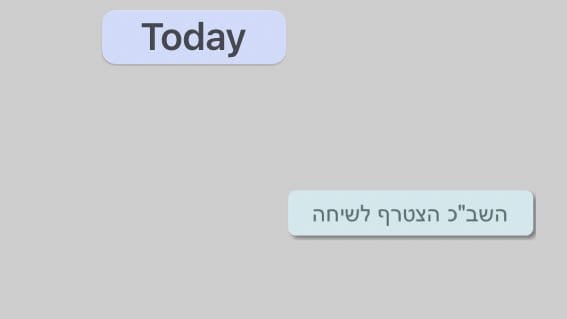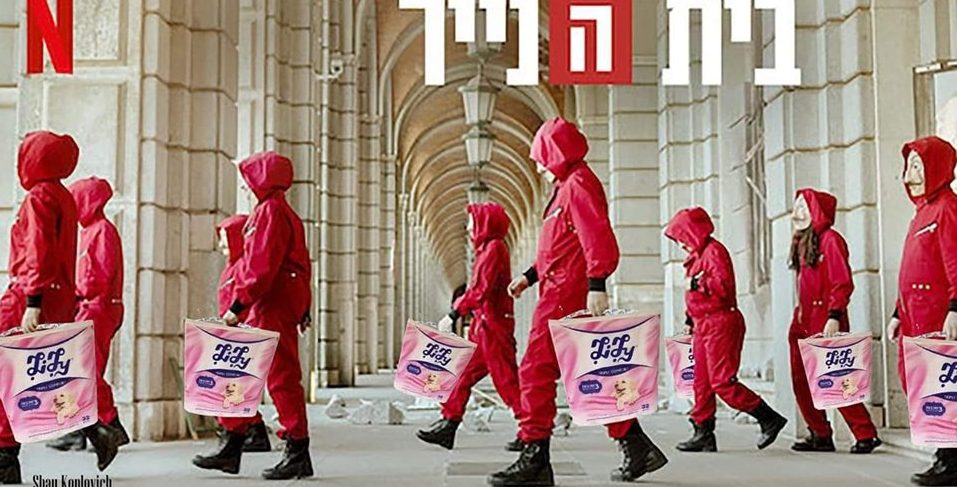The spread of coronavirus-themed jokes and memes are crossing borders and oceans faster than COVID-19 itself. While there is nothing funny about the rising numbers of the novel coronavirus infections and the fear that has gripped the world, the internet and social media are serving up much needed comic relief.
The whole world is sharing coronavirus puns and cartoons.
SEE ALSO: Israeli Designer Creates Hilarious Solutions For Everyday Local Problems

Israeli meme makers, comedy writers and the general public are in on the fun, too.
“Nothing brings people together like a laugh,” Kandi Abelson, a comedian and writer who skewers life in Israel, tells NoCamels. “Coronavirus memes are super important. I’m always looking for ways to make people smile and laugh.”
And while many of the jokes are universal, Israeli humor, specifically, is in full throttle — from satire television shows taking on the virus to meme-makers posting new puns and photos about our new surreal reality.
It took just a few hours after the announcement that the Israeli government would employ the Shin Bet internal security service to use counter-terror tech in its fight to halt the spread of the novel coronavirus in Israel, for jokes about this dubious decision to pop up on social media.
A popular sticker sent through Whatsapp groups read, in Hebrew, “the Shin Bet is part of this conversation now.”

“Israeli humor is different. There is no such thing as politically correct, nothing is sacred,” says Abelson. “In the US or Canada, there’s the North American way. ‘Please don’t give me the coronavirus, thank you for not giving me the coronavirus. Super polite.’ Whereas here, it’s [more in your face]. We’re not sensitive. We can make jokes about anything at any time. You can push the envelope further here.”
Whether being bombarded by rocket attacks or terror bombings, during war and routine insecurity, Israelis are known for their no-boundaries humor and cynicism, which bring people together to take on whatever challenge happens to be underway.

“Dark humor saves people from the seriousness and repressed emotions. Even if it shakes people it also wakes them up. I don’t think there’s any harm in making humor dark,” says Jeff Gordon, a drama and clown therapist, about the gallows humor rife in Israel. “Humor is rude and awakening and you can’t order it and put it in boundaries, it is about chaos and laughing within the chaos. It is funny that people get offended by humor. Humor is meant to offend. I’m not talking about low humor that offends races or religions or people. But dark humor is meant to offend.”
This is the country of bomb shelter selfies, rolling pin self-defense memes and Red Alert T-shirts.
It’s not just Israeli humor but a volatile mix of Israeli humor with a Jewish history that is so disastrous – from pogrom days to the Holocaust to the present – that the option between being depressed or laughing is the atmosphere pretty much all the time.
This history has created an unusual humor approach.
“Israeli humor or Jewish humor, because of the nature of history, has been dealing with tragedies and how to laugh at them,” says Gordon.
Israeli humor is not only a coping mechanism but an intrinsic self-defense method for living here. So, the coronavirus pandemic is one more way to put this aptitude for wit to the test.
And so far, based on this reporter’s social media feeds, social distancing is inspiring people from all walks of life to lighten up the mood.
Mom of four Shiri Kenigsberg Levi went viral with a rant on distance-learning in the first days after schools shuttered their gates. Levi hilariously skewers how parents, who aren’t used to being home all day with their children, are dealing with their new reality. A teacher herself, she unleashes the indignation other parents are feeling toward teachers, they deem are demanding too much. “If we don’t die of coronavirus, we’ll die of distance-learning,” she says.
Take one-and-a-half minutes to watch the hysterical outburst:
On March 16, the defense ministry announced it would turn some of the Dan Hotels in Israel into quarantine facilities. By March 17, jokes by individuals about this free-cation were up on social media. One of the most popular: “I understand those infected by coronavirus who are in stable condition will be hospitalized at the Dan hotel. I’ll wait for the next round at Carmel Forest Spa,” wrote a Facebook user, referring to a more luxurious hotel option.
Sign up for our free weekly newsletter
SubscribeMaking light of this anxiety-filled situation gives Israelis – and, obviously, others worldwide — a distraction from the chaos.
“Laughter helps maintain perspective and be in another place other than the place of panic and hysteria. It’s very hard if you’re laughing to be in a serious place. Laughter puts you in another emotional zone and as a result if you’re in another emotional zone, it can shape your way of thinking. So, it’s really important to find as many opportunities to laugh,” Gordon tells NoCamels. The 58-year-old is founder of Happiness Training, and runs drama therapy workshops on positivity and emotional wellbeing in Israel and abroad.
“Laughter is healing, it relaxes the body and triggers the release of endorphins, the body’s natural feel-good chemicals,” says Gordon, a transplanted Brit living in Israel for 30 years.
Much of the Israeli coronavirus-themed humor is original, and specific to local happenings and domestic policy. But the internet affords humor to cross countries effortlessly and adding new takes on popular memes is also prevalent.
American-Israeli comedian Benji Lovitt, who bases his comedy routines on cultural differences between Israel and elsewhere, says the coronavirus-themed jokes “know no-boundaries because this a rare international phenomena.” Speaking to NoCamels from quarantine, after returning to Israel from the US, Lovitt says, “every country has its own version of jokes. The Israeli ones are different because of local, Israel-specific references.”
After the video of Italians singing from their balconies went viral, Israelis responded with versions of their own.
In Jerusalem, people on balconies joined a sing-a-long of Ehud Manor’s song, Next Year. The lyrics: “Next year we will sit on the porch and count migrating birds.”
In Tel Aviv, an impromptu concert broke out outside a building with balconies (it was broken up by police, who cited the people gathering around were too close to one another).
In Petah Tikva, people took to their balconies to sing Idan Raichel’s song, Tribe of Brothers and Sisters, for a newlywed couple holding their wedding in the courtyard of an apartment block due to restrictions at events halls. This wedding sing-a-long was included in a hilarious mashup comparing Italian, Israeli and German balcony singing renditions.
And the comedy relief is not just on social media. The country’s leading comedy program, Eretz Nehederet (Wonderful Country), has dedicated a few shows to the coronavirus pandemic.
Nothing was off-limits.
In the show, the Messiah was sent to quarantine. The prime minister and his wife were lampooned while boogieing to “My Corona” (My Sharona, The Knacks). Even popular TV show Fauda’s characters made an appearance, tracking down a rogue high-tech worker who returned from Italy and went to a local shopping mall.
In another episode, it was noted that the reason the Ministry of Education’s website keeps crashing is because “it is not a porn site and isn’t used to so many users at once.”
On March 18, the government’s about-face regarding distance-learning forced elementary school teachers into unpaid leave. A sketch on the television show that night showed a teacher-turned-food delivery person – “food delivery is the only job left” – pulling out a whiteboard marker to give a math lesson to figure out her tip.
Another sketch shows Israel’s “supernanny” having a few meltdowns before offering unsound advice for parents stuck at home with their children.
“Even if we can’t leave it, we still have a wonderful country,” host Eyal Kitzis said at the close of one of the shows.
Indeed. And we’re always ready to poke fun at it.
Viva Sarah Press is a journalist and speaker. She writes and talks about the creativity and innovation taking place in Israel and beyond. www.vivaspress.com
Related posts

Rehabilitation Nation: Israeli Innovation On Road To Healing

Israeli High-Tech Sector 'Still Good' Despite Year Of War





Facebook comments